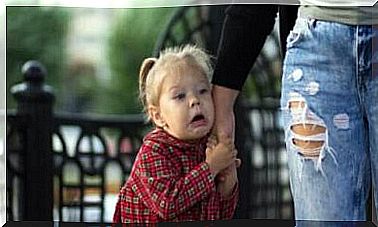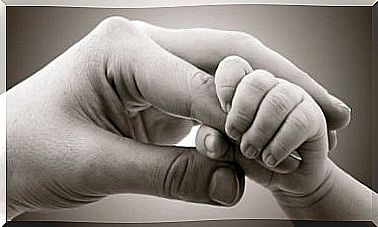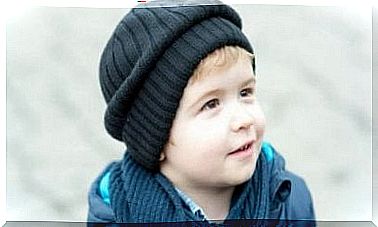What A Baby Hears Leaves An Impression On His Brain

Babies are the most receptive creatures in the world. They need stimulation, affection, caresses and most importantly, words. Everything a baby hears will leave a lasting impression on their brain. That is why we must be beautiful architects of love who can be understood by our tone. We must guide them with a warm voice that embraces and encourages them.
People who think talking to a baby is stupid are wrong. They also contribute to creating deficiencies and inhibiting the communicative processes a child needs to develop.
Everything a baby hears helps with its development
Babies should be addressed face-to-face. We have to talk to them a lot, sing to them, whisper to them and tell stories. Despite the fact that they still cannot decipher the mystery of the words we say, they are skilled translators of emotions. They are the little pioneers of the language process.
They will slowly come to understand the meaning of certain words as the days and months go by. Before we know it they will understand sentences and start communicating themselves. This fantastic process must take place in a favorable, loving and familiar environment.
Even if we don’t talk directly to our babies, everything a baby hears is absorbed into their brains which are constantly being developed. That’s why you should never hesitate, you’re doing it right. If you are a parent who never stops talking to your baby, then your baby is very lucky to have you.
We will explain why.
Routines, ideal moments that promote communication
We all know that newborns spend most of their time sleeping. However, during the first weeks and months of their lives, there are wonderful moments when we can initiate the magical process of stimulating the child’s brain through language.
- Breastfeeding is undoubtedly the best, most magical and important time to talk to your baby.
- Make sure the tone of your voice is warm and positive, and always use positive intonation.
- Try to maintain eye contact when changing their diapers, putting on clothes, and taking them off.
- Bath time is a relaxing moment where babies are receptive to their parents’ voices and gestures.
- If we manage to get a smile from them, you can be sure that you have left a mark of positivity and love in your child’s brain.
The mother’s voice leads the baby
A mother’s voice has power, it has always been there, long before the baby was born. A child has been in the womb of the woman who now cradles, feeds and cares for him for 9 months.
- When babies are born, they already recognize their mother’s voice. Amniotic fluid is a good conductor of sound. So once the fetus develops its auditory sense, the mother’s voice keeps it company every day.
- Babies don’t understand words, we all know that. But as we noted at the beginning of this article, this process is not intended to help the baby understand the semantics in every sentence.
- They will laugh and sometimes get scared when we raise our voices.
Wonderful mothers and exceptional fathers are those who nurture with affection. They leave traces of love on the brains of their children.
Everything a baby hears must be accompanied by gestures

Communicating with your baby should be reinforced with gestures and an appropriate tone. In this way we can consolidate both verbal and non-verbal language. At the same time, gestures are great promoters of moods.
- Never forget to smile while talking to your baby and always try to maintain eye contact.
- You should also set small response times, meaning you have to wait for them to respond. Wait for them to make a noise, widen their eyes, give a small beep or even a smile. This way you can also teach them about speech patterns.
It is also very important to try to understand your baby ‘s communication process. Babies also make gestures and a variety of sounds and they smile. Another way to reinforce language is to imitate their gestures and sounds. In this way we will make them feel like we understand them. Everything they say is important and appreciated.
The keys to ‘baby talk’: something we all do without realizing it
The way adults talk to babies, is ” baby talk. ” It’s a concept that most parents put into practice every day.
- No adult speaks to a baby in the same way that they would talk to other adults. Our brains actually know how best to deal with babies in order to stimulate communicative processes.
- We must not forget that language is the genetic imprint that distinguishes us from other primates. We must be prepared for our children to practice this skill early on.
- Speak to them in a high-pitched voice to get their attention.
- We also make sounds that stimulate new sensations: laughing, babbling, etc.
- This is something that no one has taught us, it is instinctive. Sometimes we say words that have no meaning, but those words can still calm our babies.

In short, there are infinite reasons to communicate with your child as early as possible. From the first moment they come into the world and their skin is close to yours. They need you, they also need to learn to communicate.
So remember that all the first words we share with them leave a mark on their brains. Any words a baby hears will help them on their way to mastering the language. They will be able to understand the world through the ever-present and warm voice that shows them the infinite affection we have for them.









